
Hatsumode in Kyoto 2026: 9 Recommended Shrines and Temples to Visit
- Written by: WESTPLAN
Japanese tend to visit a shrine or temple on New Year's Day or New Year's Eve to pray for the coming year, in a tradition called hatsumode. For visitors to Japan around this time, this is a fantastic experience to see and join in a fun New Year tradition!
With its historical shrines and temples filled with a serene atmosphere, hatsumode in Kyoto is a sensational experience in itself! Enjoy your own New Year’s visit at these 8 temples and shrines.
(This article may contain promotions)
1. Kiyomizu-dera Temple (清水寺)

Now when you think of the quintessential Kyoto temple, Kiyomizu-dera might come to mind. It is also famous for being registered as one of the UNESCO World Cultural Heritage "Historic Monuments of Ancient Kyoto" sites in 1994.
Founded in 778 with a history of 1200 years, and a sacred site for the Kannon Bodhisattva, it isn't just a tourist attraction – many people continue to worship here.
It is said that the 11 facial expressions and 42 hands of the gohonzon (the principal object of worship, such as Buddhist statues and images) - the 11-faced Kannon Bodhisattva - expresses great mercy and saves people from suffering. It is also said to materialize worldly wishes such as sound health, advancement in life, and good matches for relationships by praying to it.
- Hours:
- January 1–7: 6 AM–6 PM
- For details:
- See the official website
-

-
Address
1-294 Kiyomizu, Higashiyama-ku, Kyoto City, Kyoto Prefecture, 605-0862
View Map -
Nearest Station
Gionshijo Station (Keihan Line)
25 minutes on foot
- Phone Number 075-551-1234
-
Address
1-294 Kiyomizu, Higashiyama-ku, Kyoto City, Kyoto Prefecture, 605-0862
2. Kitano Tenmangu Shrine (北野天満宮)

Kitano Tenmangu is also called "Kitano no Tenjin-san" and the main shrine for Tenmangu and Tenjin Shrine. It was built in 947 to honor Sugawara no Michizane, the god of learning. It is said that there are about 12,000 shrines dedicated to Sugawara no Michizane all over Japan, and most of them originated from Kitano Tenmangu through divided spirits (Mitama / the virtue of the gods enshrined at the head office).
Terakoya, private temple schools, which were popular during the Edo period (1600-1867), displayed a portrait of Michizane. He became known as the god of performing arts and the god of academics due to many praying for academic and martial arts achievements. Many visitors come to worship during the New Year's before the entrance exam season.
Many fans of Japanese history and katana visit the shrine, which is associated with Bunshin, the "god of war;" the Treasure Hall will hold an exhibition of swords and other artifacts for a limited time.
- Hours:
- December 31: Gates open at 7 AM; Amulet counter 9 AM–overnight
・January 1: Gates open all day; Amulet counter until 8:30 PM
・January 2: Gates open at 6 AM; Amulet counter 7 AM–7:30 PM
・January 3: Gates open at 6 AM; Amulet counter 7 AM–6:30 PM
(Times may vary slightly each day; please check the official website before visiting)
- For details:
- See the official website
-

-
Address
Bakurocho, Kamigyo-ku, Kyoto-shi, Kyoto, 602-8386
View Map -
Nearest Station
Kitanohakubaicho Station (Keifuku Dentetsu-kitano Line)
5 minutes on foot
- Phone Number 075-461-0005
-
Address
Bakurocho, Kamigyo-ku, Kyoto-shi, Kyoto, 602-8386
3. Yasaka Shrine (八坂神社)

Yasaka Shrine is also called "Gion-san." The shrine has a long history and was called "Gion-sha" or "Kanshin-in" until it was renamed Yasaka Shrine in 1868. The Gion Matsuri festival held in the vicinity every July is a gorgeous and beautiful event that charms visitors.
The Utsukushi Gozen-sha located to the east of the main hall enshrines the beautiful and honorable Three Goddesses of Munakata, worshiped as the deities of "fortune," "entertainment," and "beauty."
This year, on New Year's Eve, you can't wait for the New Year on the road or shrine grounds (concession stands are closed on shrine grounds). Also, the Minamiro-mon and Kita-mon will be closed, and the movement in the shrine will be in one direction. The only entrance is Nishiro-mon, and there are two exits on the east side of the main hall (Maruyama Park side).
- Hours:
- Open all day
- Events:
- Yasaka Shrine holds the “Okera-mairi” ritual around 7:30 PM on December 31, the “Okera-sai” on January 1, and the “Hatsunō Hōnō” performance on January 3. Visitors can enjoy these traditional events while making their New Year’s visit.
- For details:
- See the official website
-

-
Address
625, Gionmachikitagawa, Higashiyama-ku, Kyoto-shi, Kyoto, 605-0073
View Map -
Nearest Station
Gionshijo Station (Keihan Line)
5 minutes on foot
- Phone Number 075-561-6155
-
Address
625, Gionmachikitagawa, Higashiyama-ku, Kyoto-shi, Kyoto, 605-0073
4. Heian-Jingu Shrine (平安神宮)

Heian-Jingu Shrine was built in 1895, commemorating the 1,100th anniversary of the founding of Heiankyo, the imperial capital of Japan. It is a symbol of reconstruction that eased the emotional blow caused by the shift of the capital from Kyoto to Tokyo during the Meiji Restoration and the urban area that was devastated by war at the end of the Edo period.
It enshrines Emperor Kanmu, the first emperor of the Heian period, and Emperor Komei, the last emperor of the Heian period. During the Jidai Matsuri, also one of Kyoto's three major festivals, the spirits of Emperor Kanmu and Emperor Komei travel through Kyoto City.
Many worshipers visit Heian-Jingu Shrine for matchmaking, good luck, and warding off evil.
Every year from New Year's Eve, the shrine conducts "Shuya Manto," a ritual where all the lanterns on the shrine grounds are lit all night. They also welcome worshipers for New Year's by increasing the number of conferment places that offer "Shinpu Mamorifuda" (lucky charms to place in household Shinto altars).
- Hours:
- ・December 31 night–January 1: Open all night until 7 PM (Omamori, ofuda, and goshuin: accepted all night until around 7 PM)
・January 2–3: 6 AM–6:30 PM (Omamori, ofuda, and goshuin: 7:30 AM–6:30 PM)
・January 4–8: 6 AM–5:30 PM (Omamori, ofuda, and goshuin: 7:30 AM–5:30 PM)
・January 9–February 14: 6 AM–5 PM (Omamori, ofuda, and goshuin: 7:30 AM–5 PM)
- For details:
- See the official website
-

-
Address
97, Okazakinishitennoucho, Sakyo-ku, Kyoto-shi, Kyoto, 606-8341
View Map -
Nearest Station
Higashiyama Station (Tozai Line)
10 minutes on foot
- Phone Number 075-761-0221
-
Address
97, Okazakinishitennoucho, Sakyo-ku, Kyoto-shi, Kyoto, 606-8341
5. Shimogamo Shrine (下鴨神社)

Officially called Kamomioya Jinja, this shrine has a bit of a backstory to it. Kyoto's city was planned around the Kamogawa River. This shrine, one of Kyoto's oldest, is located downstream and now popularly known as Shimogamo (shimo = down, gamo = Kamogawa River). Records indicate that the shrine had repairs to its mizugaki (fence) in 90 BC. In 1994, the shrine grounds, including the Tadasu-no-Mori forest, were registered as a World Heritage Site.
Aioi Shrine is located in Tadasu no Mori, and it is dedicated to matchmaking. It has attracted worshipers from ancient times for its wonder-working. Here you'll find "Renri-no-Sakaki," a tree considered sacred for marriage because it comprises two trees intertwined into a single tree; it is also considered one of Kyoto's seven wonders. Tradition has it that when the sacred tree withers, it is reborn somewhere in the Tadasu-no-Mori forest. The current tree is the 4th generation.
- Hours:
- ・December 31: 6:30 AM–5 PM (then closes)
・January 1 (Midnight): Reopens at Midnight and stays open all night
・January 1: Midnight–6 PM
・January 2–3: 6:30 AM–6 PM
・From January 4: 6:30 AM–5 PM (regular hours)
- For details:
- See the official website
-

-
Address
59, Shimogamoizumigawacho, Sakyo-ku, Kyoto-shi, Kyoto, 606-0807
View Map -
Nearest Station
Demachiyanagi Station (Eizan Dentetsu Eizan Line)
10 minutes on foot
- Phone Number 075-781-0010
-
Address
59, Shimogamoizumigawacho, Sakyo-ku, Kyoto-shi, Kyoto, 606-0807
6. Kifune Shrine (貴船神社)

Kifune Shrine, located in Kifune, is the head of over 2,000 shrines that enshrine the god of water, and there are records of rebuilding the shrine dating back to 677. Worshiping at Kifune Shrine is called Sanshamode, including worshiping at the main shrine, Yui-no-Yashiro, and the rear shrine.
The main shrine was moved to its current location in 1055 when the back hall was swept away in a flood. The back hall is the founding place of the Kifune Shrine and remains a sacred place. Yui-no-Yashiro is between the two and is famous for matchmaking.
During the Heian Period, the female poet Izumi Shikibu visited the shrine due to worries about her husband's change of heart; her wishes were fulfilled, and since then, the shrine has been called the Koi-no-Miya (Shrine of Love). Worshipers continue to visit to pray for fortune and prosperity, matchmaking, and wish fulfillment.
- Hours:
- ・December 31: 6 AM–6 PM (brief closure), then 10 PM–January 1, 8 PM (reopens and stays open overnight)
・January 1: Midnight–8 PM
・January 2–3: 6 AM–8 PM
・From January 4: 6 AM–6 PM (winter hours)
- For details:
- See the official website
-

-
Address
180, Kuramakibunecho, Sakyo-ku, Kyoto-shi, Kyoto, 601-1112
View Map -
Nearest Station
Kibuneguchi Station (Eizan Dentetsu-kurama Line)
30 minutes on foot
- Phone Number 075-741-2016
-
Address
180, Kuramakibunecho, Sakyo-ku, Kyoto-shi, Kyoto, 601-1112
7. Kamigamo Shrine (上賀茂神社)

Kamo-Wakeikazuchi Shrine, known as Kamigamo Shrine, is also an old shrine where the foundation built in 678 remains almost unchanged. It was registered as a World Heritage Site in 1994.
Through the divine power of lightning, worshipers pray for protection such as warding off evil, protection from lightning strikes, and is worshiped as the guardian of electricity.
From January 1 to 3rd, they hold an event called "Yaku yoke daikon," in which they prepare daikon radish in a large pot praying for sound health, and offer it to worshipers. During the first three days of the New Year, there is a shuttle bus to Kamigamo Shrine every 10 minutes from Kyoto City Subway Karasuma Line Kitayama Station Exit 4 (100 yen per person one way).
- Hours:
- ・December 31: 8 AM–5 PM (reopens at Midnight)
・January 1: Midnight–5 PM
・January 2–5: 7 AM–4:30 PM
・From January 6: 8 AM–4:45 PM
- For details:
- See the official website
-

-
Address
339, Kamigamomotoyama, Kita-ku, Kyoto-shi, Kyoto, 603-8047
View Map -
Nearest Station
Kitaoji Station (Karasuma Line)
10 minutes by bus
- Phone Number 075-781-0011
-
Address
339, Kamigamomotoyama, Kita-ku, Kyoto-shi, Kyoto, 603-8047
8. Chion-in (知恩院)
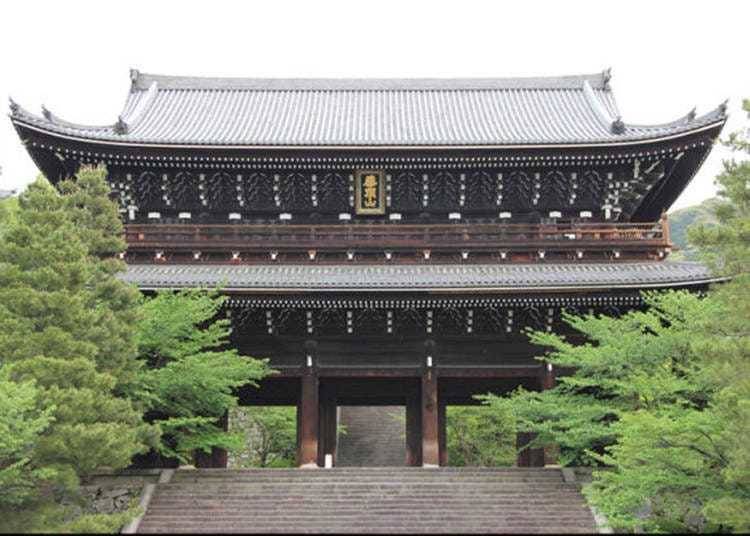
Chion-in, formally known as “Kachōzan Chionkyōin Ōtani-dera,” is the head temple of the Jōdo sect of Buddhism. Founded by Hōnen, who passed away in 1212, the temple is filled with fascinating legends known as the “Seven Wonders,” treasured artifacts, and architecture with a beauty of its own. Deep inside the grounds you’ll also find Nuregami Daimyōjin, a well-known deity associated with good relationships.
The temple’s massive bonshō (temple bell), cast in 1636, stands 3.3 meters tall, measures 2.8 meters across, and weighs an incredible 70 tons. Its New Year’s Eve ringing ceremony is especially famous. Seventeen monks join forces to strike the bell 108 times, symbolically clearing away the 108 earthly desires. It’s one of Kyoto’s most iconic sights on New Year’s Eve. Under the protection of Hōnen, visitors are believed to receive blessings to dispel worries and anxiety.
On December 27, the temple holds its “Chion-in Test Ringing,” essentially a rehearsal for New Year’s Eve, giving visitors a clear, up-close view of the powerful bell-striking in full daylight.
- Hours:
- ・December 31 (daytime): 6 AM–4 PM
・December 31 (night): Reopens around 8:30 PM for nighttime visits (*The Joya-no-Kane bell ringing requires advance registration and begins around 10:40 PM)
・January 1: 6 AM–4 PM
・From January 2: 6 AM–4 PM daily
- For details:
- See the official website
-

-
Address
400, Rinkacho, Higashiyama-ku, Kyoto-shi, Kyoto, 605-8686
View Map -
Nearest Station
Higashiyama Station (Tozai Line)
10 minutes on foot
- Phone Number 075-531-2111
-
Address
400, Rinkacho, Higashiyama-ku, Kyoto-shi, Kyoto, 605-8686
9. Matsunoo Taisha Shrine (松尾大社)

Matsunoo Taisha was built in 701 by Hata no Imikitori, but it is said that the residents enshrined the deity Ooyamakui-no-Kami in Mt. Matsunoo (behind the main hall) in ancient times. It is said to be the oldest shrine in Kyoto, and it is even noted in the Kojiki, the oldest history book in Japan.
Matsunoo Taisha is also famous for enshrining the god of sake brewing. There is a saying that using the holy water from Kame-no-I well will prevent the sake from going bad when brewing it. Since the shrine offers a blessing for sake brewing, it has many worshipers from that industry. The water from the well Kame-no-I is worshiped for its blessings of longevity and resurrection.
- Hours:
- ・December 31 (daytime): 5 AM–6 PM
・December 31 (night): Open all night until January 1 (*Nighttime prayers accepted from 9 PM–around Midnight)
・January 1: Midnight–7 PM
・January 2–3: 5 AM–6 PM
・From January 4: 5 AM–6 PM daily
- For details:
- See the official website
-

-
Address
3, Arashiyamamiyamachi, Nishikyo-ku, Kyoto-shi, Kyoto, 616-0024
View Map -
Nearest Station
Matsuotaisha Station (Hankyu Arashiyama Line)
3 minutes on foot
- Phone Number 075-871-5016
-
Address
3, Arashiyamamiyamachi, Nishikyo-ku, Kyoto-shi, Kyoto, 616-0024
Normally, hatsumode is held up to January 7 (known as 'Matsu-no-Uchi' – the day until when New Year's decorations are kept up).
In Kyoto, there are countless attractive shrines and temples other than the 9 we have introduced. We recommend looking up the blessings and history of these locations and taking your time to visit.
* Depending on the situation visiting hours and events may be changed, delayed or cancelled. Please check with their official website before visiting.
Kiko Matsuda, Keiko Kimura, Risa Tsushi, and a team of female writers familiar with Kansai. We love eating, drinking and traveling! We share fun information based on our experiences.
- Area
- Category
*Prices and options mentioned are subject to change.
*Unless stated otherwise, all prices include tax.
Popular Tours & Activitiess
Recommended places for you
-
Goods

Yoshida Gennojo-Roho Kyoto Buddhist Altars
Gift Shops
Nijo Castle, Kyoto Imperial Palace
-

Kanzenkoshitsuyakinikutabehodai Gyugyu Paradise Sannomiya
Yakiniku
Kobe, Sannomiya, Kitano
-

ISHIDAYA Hanare
Yakiniku
Kobe, Sannomiya, Kitano
-

Jukuseiniku-to Namamottsuarera Nikubaru Italian Nikutaria Sannomiya
Izakaya
Kobe, Sannomiya, Kitano
-

Tenryu-ji Temple
Temples
Arashiyama, Uzumasa
-

Kambei Sannomiyahonten
Yakiniku
Kobe, Sannomiya, Kitano
-

A First Look at NEMU RESORT’s 2026 Grand Renewal in Ise-Shima: A Resort Shaped by Village, Sea, and Forest
by: Guest Contributor
-
Ad

Iseshi Station: Gateway to Japan’s Sacred Heart and the Evolving Ise-Shima Region
-
Ad

Discover Kyoto by the Sea: Explore Nature, History, and Culinary Tradition in "Another Kyoto"
-

New Way to Reach Koyasan! Ride Nankai's 'GRAN Tenku' for a Heavenly Journey
by: Guest Contributor
-
Ad

Kumano Kodo's Nakahechi Route: A World Heritage Journey Starting from Kii-Tanabe Station
-
Ad

4 Recommended Restaurants Open After 9 PM Near JR Nara and Kintetsu Nara Station
by: Shingo Teraoka
Inspiration for Accommodations
-

Spacious Family Hotel in Namba: 20 Comfortable Stays for Family Fun
-
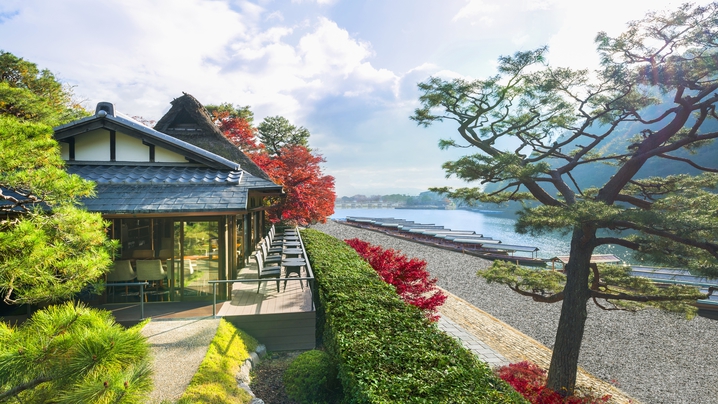
Charming Hotels to Enjoy the Spectacular Views of Arashiyama's Autumn Leaves from Your Room
-

Experience Stunning Views of Osaka Castle from Private Spaces: Top Hotels Near Osaka Castle
-
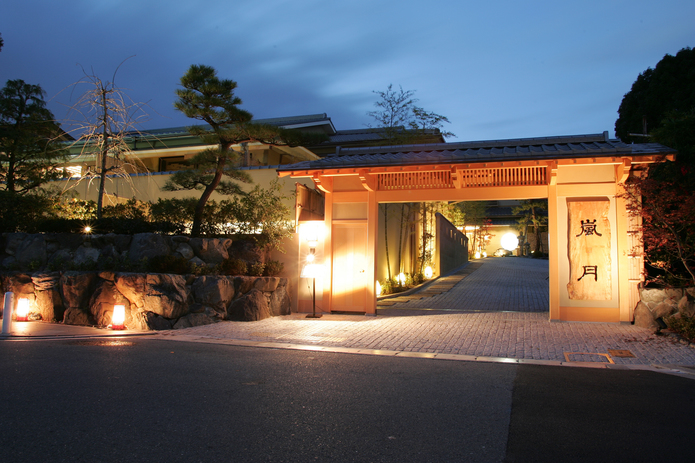
Recommended by Visitors! Arashiyama's Best-Rated Hotels
-

Family-Friendly Universal Studios Japan Hotel with Excellent Access
-
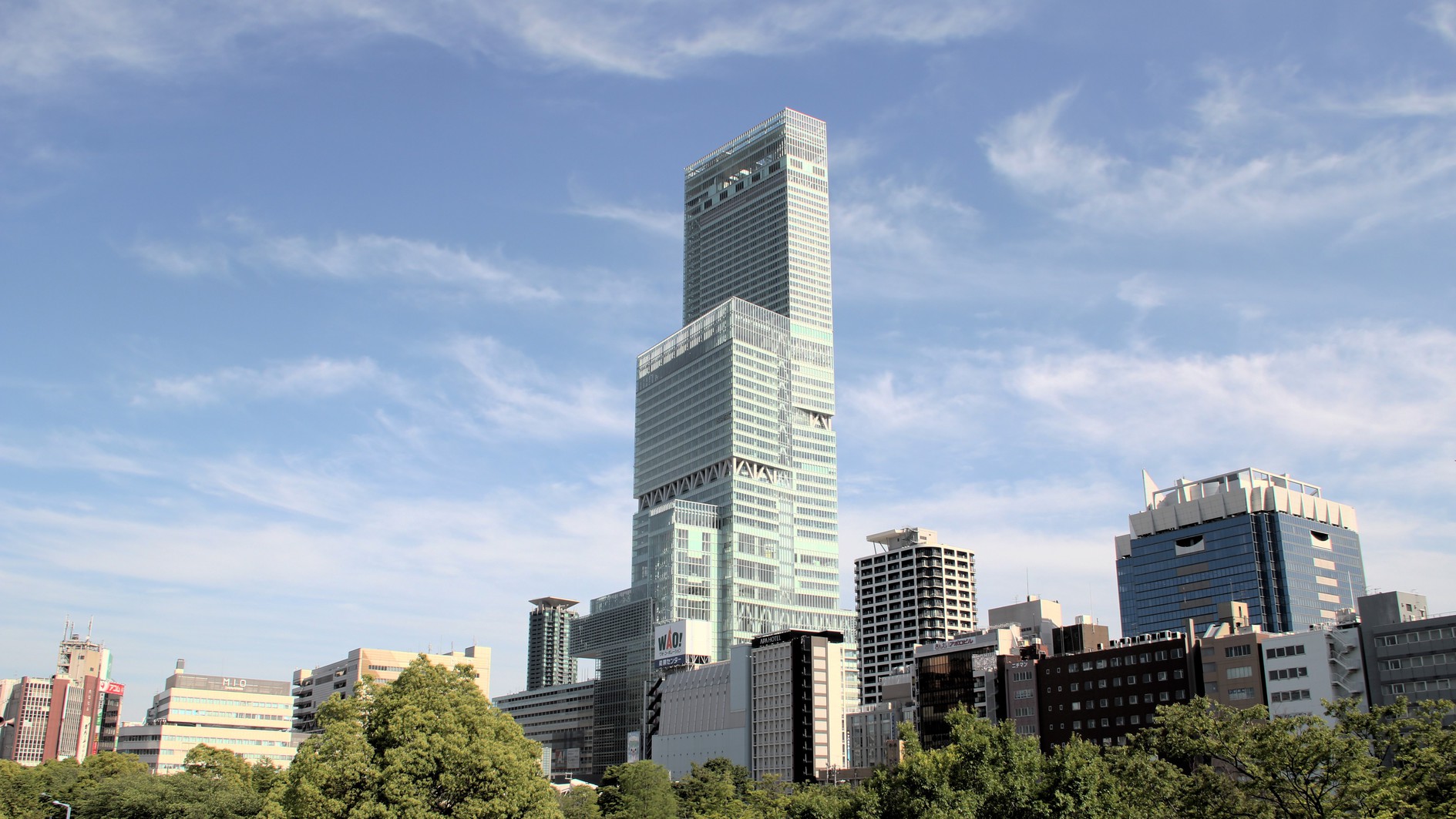
Enjoy a Comfortable Stay in Osaka! 10 Hotels with Convenient Airport Shuttle Services
-

Top 10 Recommended Hotels Near Namba Station with Great Access
-
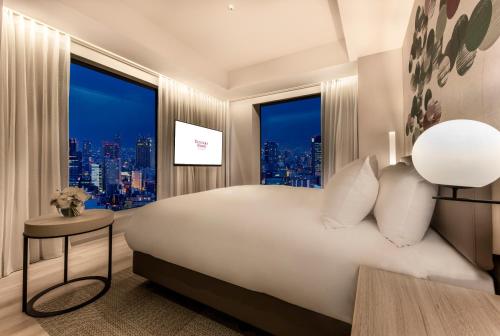
Enjoy Night Views from Your Room! Recommended Hotels in Namba Area
-

December Events in Kansai: Fun Festivals, Food, and Things to Do in Kyoto & Osaka
-

Kobe in Winter: What to Wear in December, January & February + Top Places to Visit
by: WESTPLAN
-

5 Must-Visit Nara Temples and Shrines: Discover the Timeless Beauty of Japan's Ancient Capital
by: WESTPLAN
-

Todai-ji Temple: Home to the Great Buddha of Nara - And a Nose Hole That Brings You Luck!?
by: WESTPLAN
-

Osaka in Winter (Dec/Jan/Feb): Weather, What to Wear for Adults and Kids, and Attractions
by: WESTPLAN
-

Why Osaka Tennoji Zoo is So Popular with Foreign Tourists (Guide & Highlights)
- #best gourmet Osaka
- #things to do Osaka
- #what to do in kyoto
- #what to bring to japan
- #best gourmet Kyoto
- #new years in Osaka
- #what to buy in nanba
- #Visiting Osaka
- #onsen tattoo friendly arima
- #daiso
- #Visiting Kyoto
- #best japanese soft drinks
- #japanese fashion culture
- #japanese convenience store snacks
- #japanese nail trends

























